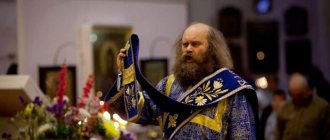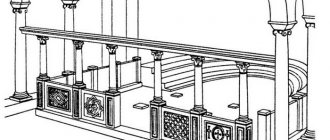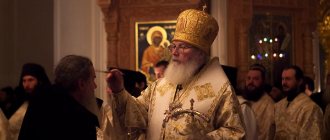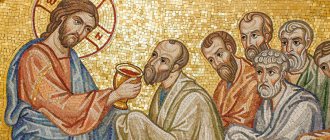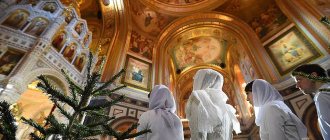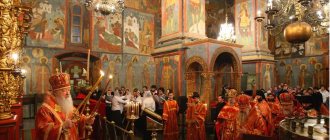Prayer for health
A special prayer for health - what is it? To find the answer to this question, it is necessary to understand the meaning of Orthodox prayer. It represents a sincere appeal to God, made with faith and humility, with awareness of one’s own sinfulness and repentance. But at the same time, with hope for the mercy of the Lord and admiration for His will.
Prayer for health
Prayer establishes a grace-filled connection between man and God. It helps us not only in saving the soul, but also in overcoming everyday difficulties. So, a special prayer for health is a request to God for strengthening health, for protection in our earthly life. Orthodox Christians can and should pray for health. The Holy Venerable Neil of Sinai instructed:
“In illnesses, before doctors and medicines, use prayer.”
At the same time, it is necessary to remember that illnesses are tests sent by God for our spiritual benefit. Or they are the consequences of our own sins. Therefore, you need to overcome them with humility and gratitude. Saint Tikhon of Zadonsk in his work “On True Christianity” notes:
“Although illness relaxes the body, it strengthens the soul... A person learns humility, patience, the memory of death and from it fervent repentance, prayer, contempt for the world and worldly vanity... Illness preserves our spirit from the rottenness and corruption of sin and does not allow passions to arise in us.” .
Prayer of gratitude to the Lord God for help
› › A prayer of gratitude to the Lord God for help, support, solutions to pressing problems, healing from illnesses - this is the gratitude that every prayer book should offer to the Creator. God is Love, and in addition to faith in Him, you must be able to give thanks. For most people, and even those who consider themselves believers, everyday life seems dull and difficult. It seems that there is absolutely nothing to express a grateful feeling of gratitude to Christ for.
This happens because people have forgotten how to accept gifts and enjoy them, considering what they receive as something they should have.
But each of us receives the richest treasures from God: life, love, friendship, the ability to breathe, think, give birth to children. It was Heaven that gave us the majestic beauty of nature, rivers and lakes, steppes, mountains, trees, the moon, celestial bodies. And not knowing how to give thanks, we do not receive other gifts. If we receive what we ask for, we can do it in our own words, or better yet, through prayers.
A special prayer for health - what is it?
Serious prayer - what is it? The word “extended” means the same as “doubled”, “strengthened”. An Orthodox Christian resorts to such prayer in specific life situations. So, it is customary to pray for a person’s health even if he is healthy. A special prayer for health is a special, intense request to God for the recovery of a sick person.
The adjective “extreme” does not mean that such prayer is more effective than ordinary prayer. It only indicates the diligent nature of the petition in a particular situation. Any prayer done with faith and repentance will bear fruit.
The church's special commemoration of Christians is performed by the priest during the Divine Liturgy. Notes with special requests are accepted in advance at the temple candle shop. It should be remembered that any church commemoration is possible only in relation to baptized Orthodox Christians.
Notes with petitions are transferred to the altar to the priest. He performs his first special commemoration at the proskomedia (Greek “offering”). This is the name of the first part of the liturgy. At this time, the priest, remembering the members of the Church, prepares the basis for the Eucharist from bread and wine. Later, a fervent prayer request for Christians is repeated in the middle of the liturgy, at the special litany.
The word “litany” is translated from Greek as “lingering” (prayer). In worship, this is the name given to the sequence of various prayer addresses. They are pronounced by a deacon (or priest) with the participation of the choir. Based on content and duration, they distinguish between great, intense, petitionary and small litanies. In the special litany, each petition is accompanied by a threefold exclamation of the choir (and everyone present in the church) “Lord, have mercy.”
Thanksgiving for every good deed of God
Glory to the Father, and the Son, and the Holy Spirit, now and ever, and unto ages of ages.
Amen. Give thanks to the unworthy, Lord, for Your great blessings upon us; we glorify You, bless You, thank You, sing and magnify Your compassion, and slavishly cry out to You in love Ti: Our Benefactor, our Savior, glory to You. We earnestly flow to You for Your blessings and gifts, as a servant of indifference, O Master, and we give thanks to You as much as we can, and we cry out to You as the Benefactor and Creator. : Glory to You, All-Bountiful God.
Mother of God, Christian Helper, Thy servants, who have gained Thy intercession, gratefully cry out to Thee: Rejoice, Most Pure Virgin Mother of God, and through Thy prayers always deliver us from all our troubles, united at all times re presenting.
We praise God to You, we confess to You the Lord, all the earth to You the Eternal Father
How else can you pray for health?
A special prayer for health is also performed in private worship (at a prayer service) and individually at home. Christians pray for health by independently reading the canon or prayers for the sick.
You can pray to the Lord, the Mother of God, angels, and saints for health. However, traditionally, in such a need, people often turn to healers and doctors glorified as saints. Among them, for example, are the Great Martyr Panteleimon, who lived in the 3rd and 4th centuries, and the outstanding scientist-surgeon of the 20th century, Saint Luke of Crimea.
Blessed Matrona of Moscow, who lived in the 20th century, is also revered as the patroness of the sick. She suffered from several serious illnesses (blindness, paralysis of the legs). But at the same time she showed Christians the greatest example of humility in the face of illness. They traditionally pray to the Mother of God for health in front of Her “Healer” icon, painted in honor of the miraculous recovery of one of the Moscow clergy of the 18th century.
Finally, a serious prayer for health is often expressed in a prayer by agreement. This is the name given to the reading of a prayer rule performed by a group of Orthodox Christians by agreement at the same time. The basis for this type of prayer is considered to be the Gospel words:
“Truly I also say to you that if two of you agree on earth about anything they ask, it will be done for them by My Father in heaven, for where two or three are gathered in My name, there I am in the midst of them.” Matthew 18:19-20).
Usually, by agreement, chapters of the Psalms or Gospels are read. A special “prayer by agreement” is added to them, and then a specific petition to God is formulated. In our case, this is a request for the healing of a sick person. It is recommended to pray in this way with the blessing of the priest.
Thanksgiving for every good deed of God
› All Christians remember God throughout the day, some do it in vain, some consciously call on the Creator.
where is nine? how did they not return to give glory to God, except this foreigner? And he said to him: get up, go; your faith has saved you (Luke 17; 12–19). The obvious condemnation of ungrateful people is the direct content of this Gospel passage.
Thanksgiving for God's good deeds is a set of prayers, akathists and troparions written by saints or a sincere appeal in their own words to the Creator, pronounced in faith and joy. Reading the prayer rules, turning to the saints with petitions, believers first of all ask for health, help in resolving family problems problems and much more, and few people put thanksgiving first. In his letter to the Thessalonians in chapter 5:16-18, the Apostle Paul clearly defined the state of Christian behavior:
- rejoice;
- pray without ceasing;
- give thanks for everything.
Here Paul gives the answer why Christians should do this, for this is God’s will for those who recognize themselves as followers of Jesus Christ. The sequence of this instruction is interesting.
When you wake up, rejoice,
Sanctification of soul and body in illness
A sick person especially needs sanctification of soul and body, that is, participation in the Church Sacraments. First of all, this is Unction (Blessing of Unction), Confession and Communion. Unction consists of anointing the sick person with consecrated oil (oil), as well as invoking Divine grace. It transforms a person, helping him to cleanse himself of spiritual and physical defilement. The Sacrament of Unction is rooted in the Gospel tradition:
“If any of you is sick, let him call the elders of the Church, and let them pray over him, anointing him with oil in the name of the Lord. And the prayer of faith will heal the sick person, and the Lord will raise him up; and if he has committed sins, they will be forgiven him” (James 5:14-15).
In the Sacrament of Confession, a person expresses before God sincere repentance for his sins and a firm intention to work for the salvation of his soul. In this case, the priest acts as a witness, a mediator. The Lord forgives the repentant sinner and gives him strength to fight sin. St. Ephraim the Syrian teaches:
“Confession of sins serves to destroy sins. God wants to hear from us our sins not because he does not know them; on the contrary, He wants us, through confession, to come to the consciousness of our falls” (“Creations”).
Eucharist (Communion) is communion with the Lord, filling a person with Christ through eating His Body and Blood (in the form of bread and wine):
“He who eats My flesh and drinks My blood abides in Me, and I in him” (John 6:56).
Through Communion, fallen human nature is healed from the fatal disease of sin. This is the restoration of our pristine nature and kindling in it the fire of Divine love. The prayer for Communion directly states that it is performed “for the healing of soul and body.”
Church Sacraments do not always lead to complete deliverance from bodily illnesses. After all, their main goal is incomparably more important - the union of man with God. At the same time, a soul nourished by His grace will certainly gain strength to endure illness and a humble understanding of the benefits of illness for the purification of the soul.
Prayers for health
Prayer for the healing of the sick
O Most Merciful God, Father, Son and Holy Soul, worshiped and glorified in the Undivided Trinity, look graciously upon Thy servant (name), who is overcome by illness; forgive him all his sins; give him healing from his illness; restore his health and bodily strength; Give him a long and prosperous life, Your peaceful and worldly blessings, so that together with us he brings grateful prayers to You, our All-Bountiful God and Creator.
Most Holy Theotokos, through Your omnipotent intercession, help me to beg Your Son, my God, for the healing of God’s servant (name).
All saints and Angels of the Lord, pray to God for His sick servant (name). Amen.
Prayer to the Mother of God in front of her “Healer” icon
Accept, O All-Blessed and All-Powerful Lady Theotokos the Virgin, these prayers, brought to You with tears from us, Your unworthy servants, who send up the singing of Your celibate image with tenderness, as if You yourself are here and heed our prayer.
For every request you fulfill, you alleviate sorrows, you grant health to the weak, you heal the weakened and sick, you drive away demons from demons, you deliver the offended from troubles, you cleanse lepers and have mercy on little children: also, to the Lady Lady Theotokos, you free from bonds and prisons and all kinds of You heal manifold passions: for all things are possible through Your intercession to Your Son, Christ our God. O All-Singing Mother, Most Holy Theotokos!
Do not cease to pray for us, Your unworthy servants, who glorify You and honor You, and who worship Your Most Pure Image with tenderness, and who have irrevocable hope and undoubted faith in You, the Ever-Virgin, Most Glorious and Immaculate, now and ever and unto the ages of ages Amen.
Prayer by agreement
(read also about health)
Lord Jesus Christ, Son of God, Thou hast declared with Thy most pure lips: “Amen, I say to you, that if two of you take counsel on earth about every thing, and if you ask for it, you will have it from My Father who is in Heaven: where are the two? or three gathered in My name, I am I in the midst of them.” Thy words are immutable, O Lord, Thy mercy is unconditional and Thy love for mankind has no end. For this reason, we pray to Thee: grant to us, Thy servants (names), who have agreed to ask Thee (request), the fulfillment of our request. But not as we want, but as You want. Thy will be done forever. Amen.
Prayer to the Great Martyr and Healer Panteleimon
Holy great martyr and healer Panteleimon, merciful imitator of God! Look with mercy and hear us, sinners, praying earnestly before your holy icon. Ask us from the Lord God, Who stands with the Angels in heaven, for the forgiveness of our sins and transgressions: heal the mental and physical illnesses of the servants of God, now remembered, those present here and all Orthodox Christians who flow to your intercession: for here we are, through our sins We are fiercely possessed by many ailments and are not imams of help and consolation: we resort to you, for you have given the grace to pray for us and heal every ailment and every illness; Grant therefore to all of us, through your holy prayers, health and well-being of souls and bodies, advancement of faith and piety, and everything necessary for temporary life and salvation, for, having been granted great and rich mercies by you, let us glorify you and the Giver of all good things, wondrous in the saints, God ours, the Father, and the Son, and the Holy Spirit. Amen.
Prayer to Saint Luke of Crimea
O all-blessed confessor, holy saint, our Father Luke, great servant of Christ! With tenderness, we bend the knee of our hearts, and fall to the race of your honest and multi-healing relics, like the child of our father, we pray to you with all diligence: hear us sinners and bring our prayer to the merciful and philanthropic God, to whom you now stand in the joy of the saints and with the faces of an angel. We believe that you love us with the same love that you loved all your neighbors while you were on earth.
Ask Christ our God to establish in his holy Orthodox Church the spirit of right faith and piety: may he give to her shepherds holy zeal and care for the salvation of the people entrusted to them: to observe the right of the believer, to strengthen the weak and infirm in the faith, to instruct the ignorant, to reprove the contrary.
Give us all a gift that is useful to everyone, and everything that is useful for temporary life and eternal salvation. Strengthening our cities, fruitful lands, deliverance from famine and destruction. Comfort for those who are grieving, healing for those who are ill, return to the path of truth for those who have lost their way, blessing from a parent, education and teaching for a child in the Passion of the Lord, help and intercession for the orphaned and needy.
Grant us all your archpastoral and holy blessing, so that through you we will get rid of the wiles of the evil one and avoid all enmity and disorder, heresies and schisms. Grant us a godly way to cross the path of temporary life, set us on the path leading to the villages of the righteous, deliver us from airy ordeals and pray to the omnipotent God for us, so that in eternal life with you we may unceasingly glorify the Father and the Son and the Holy Spirit, to Him belongs all glory, honor and hold two forever and ever. Amen.
Prayer to Blessed Matrona of Moscow
O blessed mother Matrono, hear and accept us now, sinners, praying to you, who in all your life has learned to receive and listen to all those who suffer and mourn, with faith and hope who resort to your intercession and help, giving quick help and miraculous healing to everyone; May your mercy not fail now for us, unworthy, restless in this busy world and nowhere finding consolation and compassion in spiritual sorrows and help in bodily illnesses: heal our illnesses, deliver us from the temptations and torment of the devil, who passionately fights, help us convey our everyday Cross, to bear all the hardships of life and not lose the image of God in it, to preserve the Orthodox faith until the end of our days, to have strong trust and hope in God and unfeigned love for others; help us, after departing from this life, to achieve the Kingdom of Heaven with all those who please God, glorifying the mercy and goodness of the Heavenly Father, glorified in the Trinity, the Father and the Son and the Holy Spirit, forever and ever. Amen.
Read us conveniently on social networks:
Tags: a special prayer, a special prayer for health, a special prayer for health, what is it, a special prayer, what is it
We study worship: what is a litany. Brief historical information
In church during worship we hear the words of the deacon making a series of petitions, always before the people and almost never at the altar. He loudly and chantly asks God for various needs, stretching out the orarion in front of him - a ribbon located on his left shoulder. After each petition, the choir sings “Lord, have mercy” or “Give, Lord,” depending on the request.
Since these petitions sound drawn out, they are called litany, which in ancient Greek means “lingering prayer” (from the Greek ἐκτενής). This word is found in the Church Slavonic text and reflects the way of making requests to God. In modern Greek liturgical language, these requests expressed by the deacon are called, in Greek, συναπτή (synapti), from συνάπτω (synapto) - “to connect together,” “to establish official relations,” which conveys the meaning of gathering together many petitions, or establishing relationships, in this case, with God.
Liturgist I. Dmitrevsky, in his work on the explanation of the liturgy, writes that the litany is called a union in Greek “because it unites and counts many different prayers for the entire Church in general and separately for all its members and for its needs”[1 ].
When the deacon finishes each petition, he raises the end of his orarion and crosses himself. If the service is performed without the participation of a deacon, petitions are pronounced by the priest. During the deacon’s recitation of the litany, in most cases, the priest reads a secret prayer, so called because he reads it not aloud, but “to himself,” “secretly.” In the absence of a deacon, the choir sings “Lord, have mercy” or “Give, Lord,” more protractedly, so that the priest can read the secret prayer.
The litany ends with a petition addressed to the Mother of God and an exclamation from the priest, in which he glorifies the Holy Trinity.
Photo: pokrov.kz
Litanys are divided into several types:
1) The Great Litany, or the Peaceful Litany - this is called so not only because of the initial petition: “Let us pray to the Lord in peace” and the large number of petitions in it, but also because of its importance: it precedes the beginning of services (Vespers, Matins, Liturgy) and performing Church Sacraments (Baptism, Wedding, Unction). To each request of the deacon, the choir responds once, “Lord, have mercy.” In the petitions of the great litany, “all the prayerful power of the Church, all its love is concentrated on this person, on this need”[2]. The Great Litany has been known as part of the liturgy since the 5th century.
2) Petitionary litany. It is called so because in it the deacon expresses one or another request addressed to God on behalf of those praying. The choir responds to the deacon’s petitions: “Give, Lord.”
3) The intense litany, or the litany of diligent, fervent prayer. It is called so because in her petitions, “which must be sent with all my soul with the deepest reverence” [3], jealousy is expressed, as evidenced by the triple response of the choir “Lord have mercy.” At the Divine Liturgy, this litany, pronounced after reading the Gospel, can also be supplemented with special petitions in accordance with the requests of those praying: for teaching, for passing exams, for healing from illnesses, for finding a life partner, for travelers, a petition of gratitude, etc.
4) Funeral litany. It is a variation of the special litany, since petitions for the forgiveness of sins, the mercy of God and the Kingdom of Heaven for the departed are asked with zeal. The choir responds to each request of the deacon by singing “Lord, have mercy” in three times.
5) Small litany - this is called in contrast to the great litany, because of its brevity, being limited to only three petitions. In the Small Litany there are elements of other litanies: the fervor of the special litany and the petition for peace of the Great Litany (the beginning of the small litany: “Again and again, let us pray to the Lord in peace”) are a brief testimony of the faith and hope of the Church.
The Monk John Cassian the Roman (5th century), describing the silence and brevity of prayers among the Egyptians, notes: “They consider it more useful to perform prayers, even if they are short, but more often, so that through frequent prayers they can remain in unceasing union with God, and through short prayers they can avoid the arrows of the devil , attacking us especially during prayer”[4].
The Small Litany is often heard when it is necessary to shift the attention of those praying from their requests and needs, the glorification of the saints and the singing of psalms to the glorification of the Trinity God. Saint John Chrysostom in his “Discourse on the Second Epistle of the Apostle Paul to the Corinthians” says: “Since in long-term teaching the soul usually seems to fall asleep, then the deacon again awakens it and says: let us pray more diligently!”[5].
6) The litany of the catechumens at the Divine Liturgy traditionally ends that part of the service at which the catechumens who wished to receive Holy Baptism were allowed to attend. This litany consists of several petitions to God to prepare the catechumens for Baptism, enlighten them with the word of truth, reveal the Gospel of truth, unite the holy Church and save them with Divine grace. The litany ends with the words of the deacon, “Catechumen, come forth,” calling on the catechumens to leave the church, since what is happening in the church, for proper understanding, must be explained to the catechumens during non-liturgical times. After the deacon’s words: “Catechumenate, go out,” the doors of the church should be closed so as not to let anyone in or out, those who came to the feast of faith, since the liturgy requires the maximum possible participation and aspiration of the whole person towards God.
Order of the Divine Liturgy. Litany of the Catechumens. Photo: labirint.ru
There are also varieties of litanies pronounced at certain services, containing special petitions added to the Great or Small Litany (for example, during the Sacrament of Baptism, Wedding, Unction, before kneeling prayers at Vespers on the day of Pentecost, or the Funeral service (Parastas)).
The Liturgy of the Presanctified Gifts contains litanies found in the Divine Liturgy of St. John Chrysostom, some of which have been changed in the context of the use of this liturgy. For example, the litanies at the Liturgy of the Presanctified Gifts do not contain requests for the consecration of the gifts, since they were already consecrated at the Liturgy of St. Basil the Great or St. John Chrysostom and are presanctified - consecrated before. At the Liturgy of the Presanctified Gifts from Wednesday of the fourth Sunday of Great Lent, even if there happens to be a “celebrated day other than Saturdays and weeks”[6], the liturgy for the catechumens is pronounced with the addition of a number of petitions relating to those “preparing for enlightenment”, those catechumens who are on the final stages of preparation for the Sacrament of Baptism on Easter.
There is also a special form of litany recited at the litia (in Greek λιτή, request, supplication) at Great Vespers, consisting of several long petitions, increased by the mention of the names of many saints, through whom the worshipers turn to God. The choir answers “Lord, have mercy”: to the first petition - 40 times; for the second – 50 times; on the third and fourth - three times each[7].
The beginning of the litany, according to Archpriest Gregory Debolsky[8], is rooted in the words spoken by the Lord to the prophet Jeremiah: “Call to Me, and I will answer you” (Jer. 33:3). The first petitions, similar to litanies, are found in the Liturgy of the Apostle James.
There is also a number of ancient evidence about the litanies:
1) In the “Apostolic Constitutions” (1st century) (book 8, chapter 10) the words are put into the deacon’s mouth: “Let us pray for the peace and well-being of the world and the holy Churches, let us pray, that the God of all may give us His unceasing and inalienable peace, having given the fullness of the virtues that continue to keep us according to piety.
Let us pray for the holy catholics and apostles of the Church, from end to end, that the Lord will keep it unshakable and undisturbed and keep it founded on stone until the end of time.
And let us pray for this holy region, for the Lord of all will vouchsafe us to relentlessly pursue His heavenly hope and unceasingly repay Him the duty of prayer.
For every bishopric under heaven, let us pray for the right of those who rule the word of Thy truth, and for our bishop Jacob and his provinces, let us pray, for our bishop Clement and his provinces, let us pray, for our bishop Euodius and his provinces, let us pray, for may God grant their bounty to the saints To their Churches they are healthy, honest, long-living, and will give them an honest old age in piety and truth.
And let us pray for our presbyters, that the Lord will free them from every baseless and evil deed and grant them the presbytery soundly and honestly.
Let us pray for all the diaconate and ministry in Christ, that the Lord may grant them immaculate service.
For readers, singers, virgins, widows and orphans, let us pray for those in marriage and children, so that the Lord will have mercy on all of them.
Let us pray for the eunuchs who walk reverently.
Let us pray for others in abstinence and reverence.
Let us pray for those who bear fruit in the holy Church and give alms to the poor, and for those who bring sacrifices and first fruits to the Lord our God, so that the all-good God of heaven will reward them with his gifts and give them a hundredfold in the present, but in the future eternal life, and will give them eternal life instead of temporary ones, instead of earthly ones, heavenly ones.
Let us pray for our newly enlightened brothers, that the Lord may confirm and strengthen them.
Let us pray for our suffering brethren in their weakness, that the Lord will free them from all illnesses and all illnesses and raise them up to be healthy among the saints of His Church.
Let us pray for those sailing and traveling.
For those in ore and imprisonment and in prison and chains, let us pray in the name of the Lord.
Let us pray for those who labor in bitter toil.
Let us pray for those who hate us and for those who persecute us in the name of the Lord, so that by taming their fury, the Lord will dispel their anger against us.
Let us pray for those who are outside and lost, that the Lord may convert them.
Let us remember the infants of the Church, so that the Lord, having accomplished them in His fear, will bring them to the measure of their age.
Let us pray for each other, that the Lord will protect and preserve us with His grace to the end and free us from the evil one and from all the temptations of those who practice lawlessness, and fall into His heavenly kingdom.
Let us pray for every Christian soul.
Save and restore us, O God, by Thy mercy.
Let's rise up. Having prayed diligently, we will betray ourselves and each other to the Living God through Christ.”[9]
The breadth of petitions shows liturgical creativity in the field of litany, which was quite developed already in the 1st century, which is, of course, due to the diversity of petitions.
Photo: pavlovsk-xram.ru
2) Tertullian in his “Apology ” (c. 200) (chapter 30, 4) writes: “We always ask for all emperors a long life, a calm reign, a safe family, a brave army, a faithful Senate, a well-behaved people, a country calm and everything that is desired by both man and Caesar”[10]
3) Saint Basil the Great, in a letter of the 150th, to Soranus, the commander of Scythia (c. 373), writes: “Being faithful to the grace of God, of course, you remember the church proclamations, you remember that we pray for the brethren who are in exile, we perform also prayers in the Holy Church for those included in the military lists, for those who profess the name of the Lord with boldness and for those who have shown spiritual fruits, and, without a doubt, among many of them or along with all, as I think, your honor is included.”[11] .
4) Saint John Chrysostom in his “Conversation on the Ascension of the Lord” says that “there are angels of peace, listen to how the deacons always say in their prayers: we ask for an angel of peace”[12].
In “III Sermon on the Incomprehensible against the Anomeans,” the saint says: “we are commanded to pray to God for the sick, for those in the mines and in grave slavery, and for the possessed.”[13]
Thus, special petitions, as an expression of our specific requests to God, have existed since the 1st century, as evidenced by the above-mentioned Apostolic Decrees. Later, these petitions were grouped into prayers, pronounced loudly and in a chant, which have come down to us in the form of litanies of several types: Great, Small, Augmented, Petitionary, Requiem, litany of the catechumens and litany at the litia.
[1] Dmitrevsky I. Historical, dogmatic and sacramental explanation of the Divine Liturgy. M., 1993. P. 187.
[2] Schmeman A., prot. Eucharist. The Mystery of the Kingdom. M., 1993. P. 97.
[3] Dmitrevsky I. Historical, dogmatic and sacramental explanation of the Divine Liturgy. M., 1993. P. 239.
[4] John Cassian the Roman, St. About the decrees of the Cenobites. Book two. About night prayers and psalmody. Chapter 10. On the silence and brevity of prayers performed by the Egyptians // John Cassian the Roman, St. Scriptures. STSL. 1993. P. 18.
[5] John Chrysostom, St. Discourse on the Second Epistle of the Apostle Paul to the Corinthians.
[6] Missal. Divine Liturgy of the Presanctified Gifts of St. Gregory the Dvoeslov. K., 2012. Ps. 46–47.
[7] Missal. The sequence of Vespers, Matins, Dismissals, Prokeimna and Months. K., 2012. Ps. 44–53.
[8] Debolsky G., prot. The Orthodox Church in its sacraments, worship, rituals and requirements. M.: Father's house. 1994. P. 41.
[9] Apostolic decrees, through Clement, bishop and citizen of Rome, book. 8, ch. 10. // https://yakov.works/acts/04/2/constit_apost.htm
[10] Quintus Septimius Florence Tertullian. Apologetic. To Scapula. St. Petersburg 2005. P. 163.
[11] Basil the Great, St. Letters. M. 2007. Ps. 268–269.
[12] John Chrysostom St. The discourse on the Ascension of our Lord Jesus Christ was said in the Church of the Martyrs in Romanesia, where the bodies of the martyrs, which lay hidden near the corpses of heretics, were transferred and placed especially at the top, 1 // Works of our Holy Father John Chrysostom, Archbishop of Constantinople in the Russian translation. T. 2. Book. 1. St. Petersburg 1896. Ss. 485–486.
[13] John Chrysostom St. III A Word about the incomprehensible and that even God’s condescension is unbearable for the seraphim, against the Anomeans, 3.6 // Works of our Holy Father John Chrysostom, Archbishop of Constantinople in Russian translation. T. 1. Book. 2. St. Petersburg 1898. P. 510.
